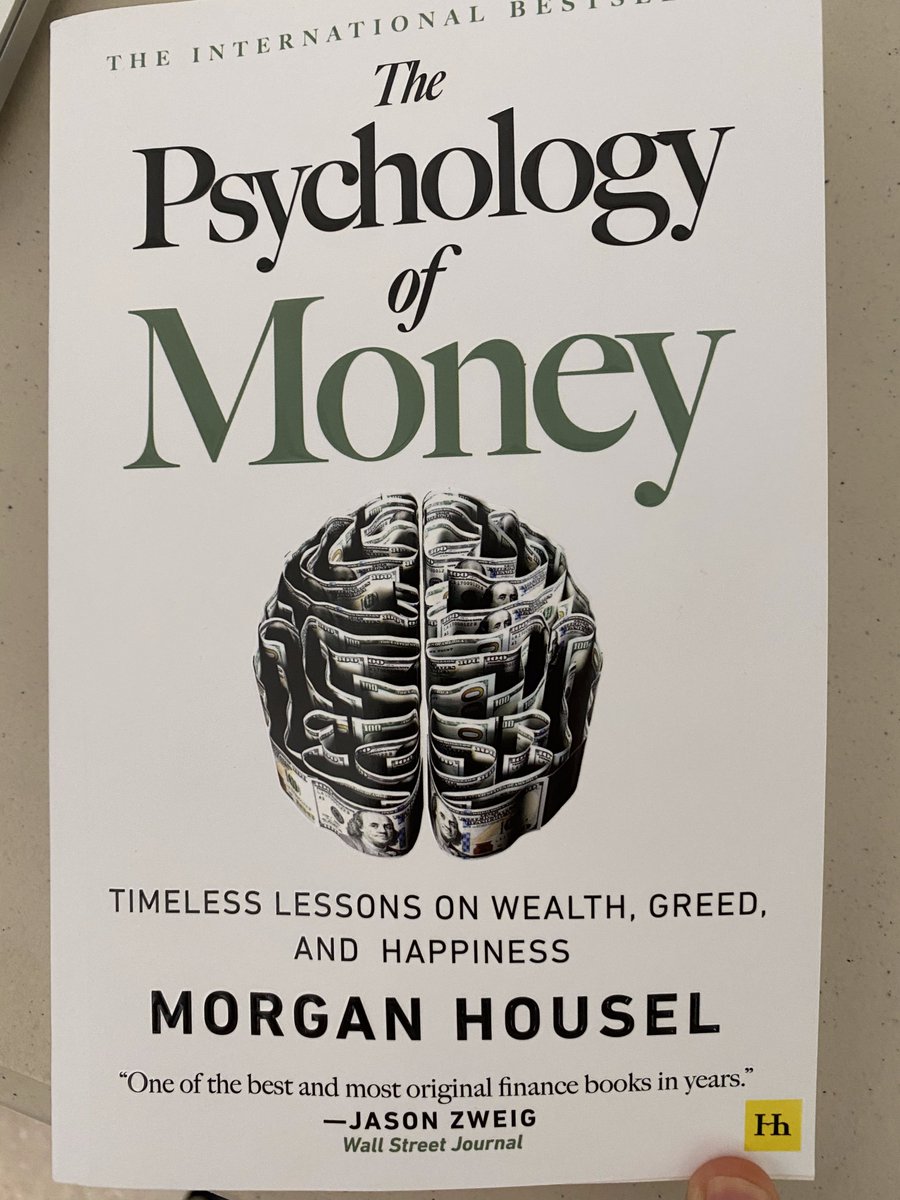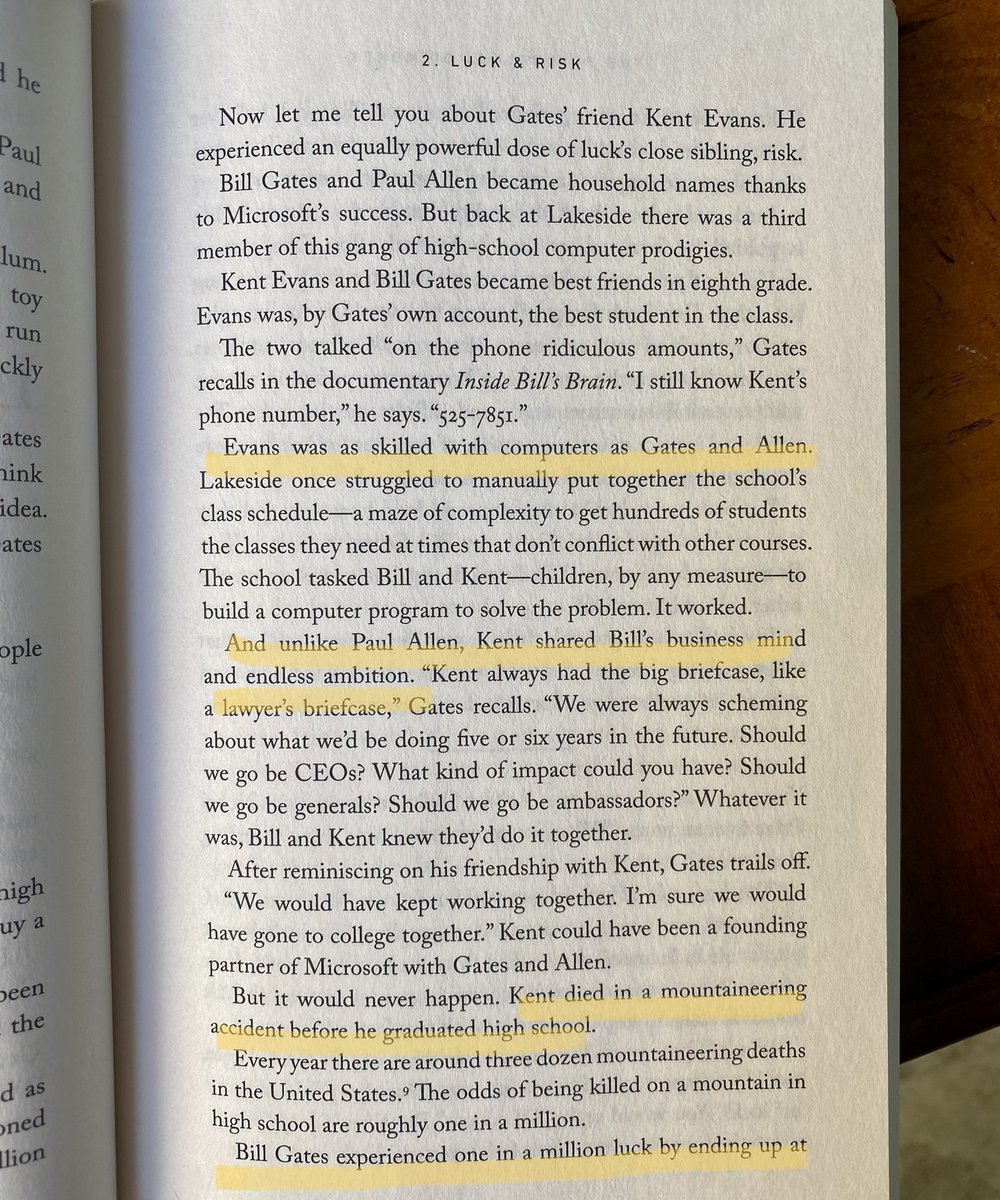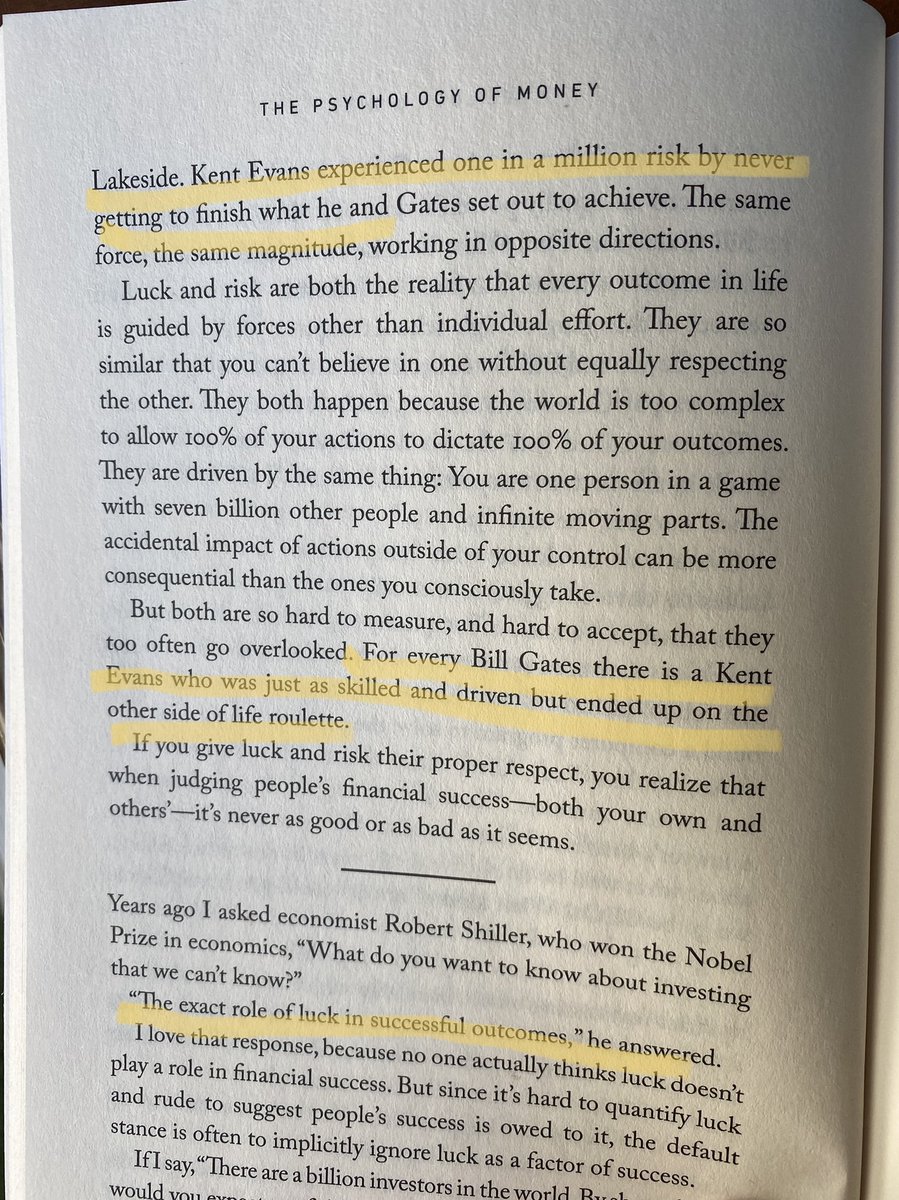Ever heard of the Teletype Model 30 computer?
Of course you haven& #39;t.
In 1968 only 300 high school students in the ENTIRE world had access to one.
Bill Gates was one of them.
(THREAD) on how much we underestimate the role luck plays in HUGE success.
 https://abs.twimg.com/emoji/v2/... draggable="false" alt="👇" title="Rückhand Zeigefinger nach unten" aria-label="Emoji: Rückhand Zeigefinger nach unten">
https://abs.twimg.com/emoji/v2/... draggable="false" alt="👇" title="Rückhand Zeigefinger nach unten" aria-label="Emoji: Rückhand Zeigefinger nach unten"> https://abs.twimg.com/emoji/v2/... draggable="false" alt="👇" title="Rückhand Zeigefinger nach unten" aria-label="Emoji: Rückhand Zeigefinger nach unten">
https://abs.twimg.com/emoji/v2/... draggable="false" alt="👇" title="Rückhand Zeigefinger nach unten" aria-label="Emoji: Rückhand Zeigefinger nach unten">
Of course you haven& #39;t.
In 1968 only 300 high school students in the ENTIRE world had access to one.
Bill Gates was one of them.
(THREAD) on how much we underestimate the role luck plays in HUGE success.
This  https://abs.twimg.com/emoji/v2/... draggable="false" alt="🧵" title="Thread" aria-label="Emoji: Thread"> includes excerpts (shown in quotes) from the fantastic book
https://abs.twimg.com/emoji/v2/... draggable="false" alt="🧵" title="Thread" aria-label="Emoji: Thread"> includes excerpts (shown in quotes) from the fantastic book
There were 300 million high school aged students in the world in 1968 according to the UN.
Bill Gates and Paul Allen happened to go to Lakeside High, the only school in the world with a computer.
The odds of that?
0.000001%
Bill Gates and Paul Allen happened to go to Lakeside High, the only school in the world with a computer.
The odds of that?
0.000001%
"Gates was 13 years old in 1968 when he met his classmate Paul Allen. Allen was also obsessed with the school& #39;s computer, and the two hit it off.
Lakeside& #39;s computer wasn& #39;t part of its general curriculum. It was an independent study program."
Lakeside& #39;s computer wasn& #39;t part of its general curriculum. It was an independent study program."
Bill and Paul "could toy away with the thing at their leisure, letting the creativity run wild--after school, late into the night, on weekends."
"If there had been no Lakeside, there would have been no Microsoft," Gates openly admits.
"If there had been no Lakeside, there would have been no Microsoft," Gates openly admits.
"[Bill and Paul] quickly became computing experts.
During one late-night session, Allen recalled Gates showing him a Fortune magazine and saying, & #39;What do you think it& #39;s like to run a Fortune 500 company& #39;
& #39;Maybe we& #39;ll have our own computer company someday,& #39; Gates said."
During one late-night session, Allen recalled Gates showing him a Fortune magazine and saying, & #39;What do you think it& #39;s like to run a Fortune 500 company& #39;
& #39;Maybe we& #39;ll have our own computer company someday,& #39; Gates said."
"Bill Gates and Paul Allen became household names thanks to Microsoft& #39;s success." And founded a company with now an almost $2T market cap.
But no one& #39;s heard of Kent Evans. Bill& #39;s other best friend in the eighth grade.
But no one& #39;s heard of Kent Evans. Bill& #39;s other best friend in the eighth grade.
"Evans was as skilled with computers as Gates and Allen... And unlike Allen, Kent shared Bill& #39;s business mind and endless ambition.
& #39;We were always scheming about what we& #39;d be doing five or six years in the future.& #39;"
& #39;We were always scheming about what we& #39;d be doing five or six years in the future.& #39;"
"& #39;Kent always had a briefcase, like a lawyer& #39;s briefcase,& #39; Gates recalls.
& #39;Should we go be CEOs? What kind of impact could you have? Should we be generals? Should we go be ambassadors?& #39;
Whatever it was, Bill and Kent knew they& #39;d do it together."
& #39;Should we go be CEOs? What kind of impact could you have? Should we be generals? Should we go be ambassadors?& #39;
Whatever it was, Bill and Kent knew they& #39;d do it together."
"But it would never happen, Kent died in a mountaineering accident before he graduated high school.
Every year there are around three dozen such deaths in the United States.
The odds of being killed on a mountain in high school are roughly one in a million"
Every year there are around three dozen such deaths in the United States.
The odds of being killed on a mountain in high school are roughly one in a million"
"Bill Gates experienced one in a million luck by ending up at Lakeside.
Kent Evans experienced one in a million risk by never getting to finish what he and Gates set out to achieve.
The same force, the same magnitude, working in opposite directions."
Kent Evans experienced one in a million risk by never getting to finish what he and Gates set out to achieve.
The same force, the same magnitude, working in opposite directions."
"Luck and risk are both the reality that every outcome in life is guided by forces other than individual effort.
...you can& #39;t believe in one without equally respecting the other.
Both are so hard to measure, and hard to accept, that they too often go overlooked."
...you can& #39;t believe in one without equally respecting the other.
Both are so hard to measure, and hard to accept, that they too often go overlooked."
"For every Bill Gates there is a Kent Evans who was just as skilled and driven but ended up on the other side of life roulette.
Gates is staggeringly smart, even more hardworking, and had a vision for computers...
He also had a one in a million chance of going to Lakeside."
Gates is staggeringly smart, even more hardworking, and had a vision for computers...
He also had a one in a million chance of going to Lakeside."
"Years ago I asked economist Robert Shiller, who won the Nobel Prize in economics, "What do you know about investing that we can& #39;t know?"
"The exact role of luck in successful outcomes," he answered.
"The exact role of luck in successful outcomes," he answered.
"If I say, & #39;There are a billion investors in the world. By sheer chance, would you expect 10 of them to become billionaires predominantly off luck?& #39;
You would reply, & #39;Of course.& #39;
But if I asked you to name those investors-to their face-you will likely back down."
You would reply, & #39;Of course.& #39;
But if I asked you to name those investors-to their face-you will likely back down."
"When judging others, attributing success to luck makes you look jealous and mean, even if we know it exists.
And when judging yourself, attributing success to luck can be too demoralizing to accept."
And when judging yourself, attributing success to luck can be too demoralizing to accept."
The whole point of this thread is to make the point that we don& #39;t know how much luck and risk play a part in success.
But it does play a big part, especially in cases of outliers.
But it does play a big part, especially in cases of outliers.
Would Gates have been successful without the massive head start he had in computing?
No doubt.
Would he have been a millionaire?
Yes, probably. He has incredibly smarts and work ethic.
Billionaire?
Unclear.
The world& #39;s richest man?
Almost certainly not.
No doubt.
Would he have been a millionaire?
Yes, probably. He has incredibly smarts and work ethic.
Billionaire?
Unclear.
The world& #39;s richest man?
Almost certainly not.
What if Bill had never gone to Lakeside High School?
Would he have even opened an issue of Popular Electronic Magazine later on in 1975 and read about the Altair 8800 mini-computer?
Would he still have dropped out of Harvard within that year to start Microsoft?
Would he have even opened an issue of Popular Electronic Magazine later on in 1975 and read about the Altair 8800 mini-computer?
Would he still have dropped out of Harvard within that year to start Microsoft?
I think Nick Huber sums it up very well here: https://twitter.com/sweatystartup/status/1375894338534846466?s=20">https://twitter.com/sweatysta...
And here: https://twitter.com/sweatystartup/status/1345862709145980929?s=20">https://twitter.com/sweatysta...
And in the end, does it really matter if you become the next Gates or Jobs?
No, not really.
You can still be incredibly successful even if luck doesn& #39;t befall you just right.
It& #39;s 95% within your control.
No, not really.
You can still be incredibly successful even if luck doesn& #39;t befall you just right.
It& #39;s 95% within your control.
It& #39;s estimated that we make some 773,000 decision in the course of our lifetime.
Successful people are where they are largely due to making good decisions.
That& #39;s all we can control.
Successful people are where they are largely due to making good decisions.
That& #39;s all we can control.
Charlie Munger wraps it up nicely:
“Spend each day trying to be a little wiser than you were when you woke up. Day by day, and at the end of the day-if you live long enough-like most people, you will get out of life what you deserve.”
“Spend each day trying to be a little wiser than you were when you woke up. Day by day, and at the end of the day-if you live long enough-like most people, you will get out of life what you deserve.”

 Read on Twitter
Read on Twitter includes excerpts (shown in quotes) from the fantastic book" title="This https://abs.twimg.com/emoji/v2/... draggable="false" alt="🧵" title="Thread" aria-label="Emoji: Thread"> includes excerpts (shown in quotes) from the fantastic book" class="img-responsive" style="max-width:100%;"/>
includes excerpts (shown in quotes) from the fantastic book" title="This https://abs.twimg.com/emoji/v2/... draggable="false" alt="🧵" title="Thread" aria-label="Emoji: Thread"> includes excerpts (shown in quotes) from the fantastic book" class="img-responsive" style="max-width:100%;"/>
!["[Bill and Paul] quickly became computing experts.During one late-night session, Allen recalled Gates showing him a Fortune magazine and saying, & #39;What do you think it& #39;s like to run a Fortune 500 company& #39;& #39;Maybe we& #39;ll have our own computer company someday,& #39; Gates said." "[Bill and Paul] quickly became computing experts.During one late-night session, Allen recalled Gates showing him a Fortune magazine and saying, & #39;What do you think it& #39;s like to run a Fortune 500 company& #39;& #39;Maybe we& #39;ll have our own computer company someday,& #39; Gates said."](https://pbs.twimg.com/media/EzgduJZX0AgE3kh.jpg)





